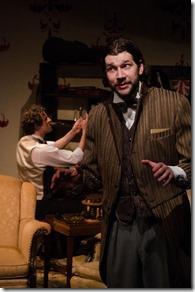
A Study in Scarlet
Based on story by Sir Arthur Conan Doyle
Adapted and Directed by Paul Edwards
Athenaeum Theatre, 2936 N. Southport (map)
thru June 1 | tickets: $22 | more info
Check for half-price tickets
Read entire review
More showing, less telling: it’s elementary
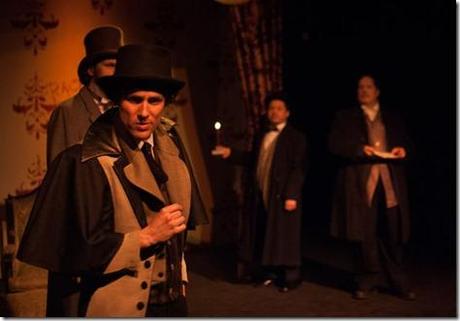
Promethean Theatre Ensemble presents
A Study in Scarlet
Review by ReviewerName
Crime whodunits are a dime a dozen these days, from the sordid “CSI” franchise to the sublime British “Prime Suspect”, to the more comedic antics of crime solvers in series such as “Monk” and “Psych”. But before this genre was commonplace, there was Sherlock Holmes, the first “Consulting Detective.” Such an impression did this character make that his legacy continues today, from the original characters re-imagined in modern day (Sherlock), to dark derivatives of the Holmes/Watson duo (Gregory House/James Wilson). We love a good mystery, and we especially love it dipped in crime.
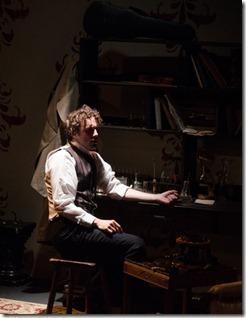
It’s a daring move to adapt this first story of a successful and well-known series, where now-loved characters are still raw and less developed. It’s clear that Doyle had the character of Holmes well conceived, based as he was on a real-life professor of his, but the chemistry between Holmes and Watson is not yet established. Even more problematic is the story itself: while later stories bring brain-teasing clues, red herrings, and bizarre situations, this first story is clearly more focused on the character of Holmes himself rather than on the plot. We are introduced to the uncanny observational powers that became Holmes’ trademark (“I see that of course you have returned from fighting in Afghanistan”), often to good comedic effect, but the crime and its subsequent solution are not particularly interesting. There is a crime, a clue or two, and an ultimate explanation of motive that is so far removed from the precious little we have been presented as to make it more story than mystery. (A needless decision to show the killer during a policeman’s retelling of an encounter removes any puzzle over his identity.)
A good adaptation takes skill; it remains true to the story’s plot and the characters, keeping the sensibility of the original while leveraging the advantages of the medium to which it’s adapted. Edwards does show skill in his modification of an offensively inaccurate anti-Mormon section of the original, doing an admirable job in re-tailoring the plot line to maintain an original thread and voice without damning an entire people. (Doyle himself expressed regret at this portion of the story and had issued an apology, so this re-write may be more in keeping with Doyle’s ultimate intent.) Where this adaptation falls short, however, is in choosing a narration-heavy approach rather than dramatization and characterization to create personae and bring the story to life.
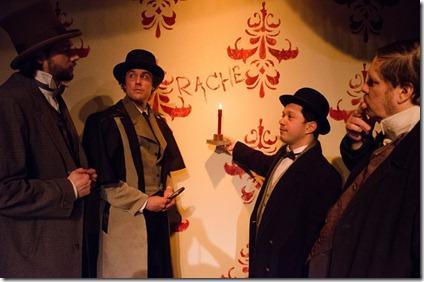
Just as the Sherlock Holmes stories are written in the first person in the voice of Dr. John Watson, the show’s Watson (Brian Pastor) narrates most of the play. It’s an overused, unnecessary device that reduces Watson’s engagement in the story, and acts as a wall between the action and audience. Having Watson describe Holmes rather than letting us get to know him directly through his own behavior makes no sense, given Holmes’ generally entertaining eccentric personality. Holmes should dominate the show; this isn’t the case. And while Pastor’s Watson is a consistent character, his narration comes across more as an FYI than storytelling. Edwards may have been trying for a contrast between Holmes’ eccentric, energetic persona (well-realized by Lake) and that of the more laid-back Watson, but the result is flat. The show doesn’t work as a character piece because characters remain undeveloped under a mantle of narrative, and it doesn’t work as a plot-driven piece because the crime plot itself isn’t all that engaging.
Other characters, such as the subsequently regular figure of Inspector Lestrade (David Fink), make appearances as the story builds, adding some variety if not much in the way of plot depth. Dave Skvarla as Jefferson Hope feels like a wasted resource; why Edwards chose the character of Watson to narrate Hope’s tale rather than Hope himself isn’t clear, as this would have provided a nice change and made more sense.
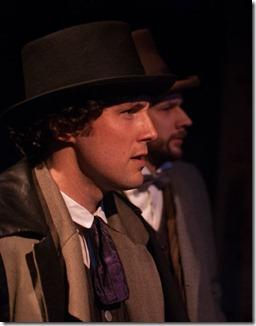
Liz Cooper’s lighting design has similar problems. There are times when areas of the stage where characters are active were so underlit that I thought perhaps a light had blown, but then the lights came up for a scene change, killing that theory. There are times when the lighting clearly directs attention to particular action, but overall, the design feels random and tentative.
There are good elements in the show. Nick Lake gives us a nicely intense Sherlock Holmes with well-timed delivery; it would be nice to see more of him in action. Kevin Gladish does a good job as the menacing and licentious Drebber, and Richard Furleigh is a nicely creepy Stangerson. Cathlyn Melvin impresses with her portrayal of several characters, but most noticeably the sweetly genuine Lucy. There is an endearing earnest community-theater feel to the piece that makes it fun to watch despite its drawbacks. The cast works hard, and their commitment is evident.
Edwards says in his notes that this is his favorite of the Sherlock Holmes stories. Perhaps he is too close to it to make the kinds of changes that could make this story sparkle onstage. With a little less talking and more showing, this show could be a gem.
Rating: ★★½
A Study in Scarlet continues through June 1st at Athenaeum Theatre, 2936 N. Southport (map), with performances Thursdays-Saturdays at 8pm, Sundays 2pm. Tickets are $22, and are available by phone (773-935-6875) or online through OvationTix.com (check for half-price tickets at Goldstar.com). More information at PrometheanTheatre.org. (Running time: 90 minutes, no intermission)
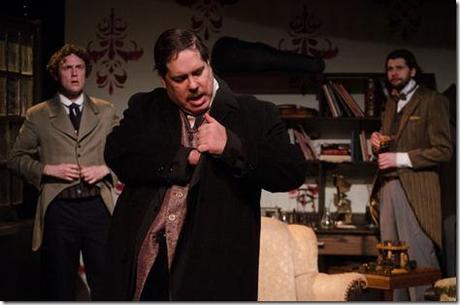
artists
cast
Elaine Carlson (Landlady, Mme Charpentier), Jared Denis (Arthur, Brother 2, u/s John Watson; others), David Fink (Inspector Lestrade), Richard Furleigh (Stangerson, u/s Jefferson Hope), Kevin Gladish (Drebber), Drew Johnson (Male Understudy), Evan Johnson (Rance, Brother 1, and others), Christina Renee Jones (Female Understudy), Edward Kuffert (Inspector Gregson), Nick Lake (Sherlock Holmes), Cathlyn Melvin (Wiggins, Alice, Lucy), Drew Longo (Stanford, Ferrier, u/s Sherlock Holmes; others), Brian Pastor (John Watson), Dave Skvarla (Jefferson Hope)
behind the scenes
Paul Edwards (adaptor, director), Alexa Berkowitz (stage manager), Liz Cooper (lighting design); Catherine Gillespie (dialect coach), Beth Laske-Miller (costume design), Ross Lemmon (props design), Roger Wykes (set design), David Yondorf (violence design)
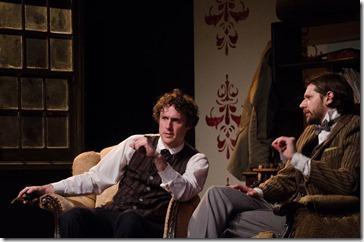
13-0508

